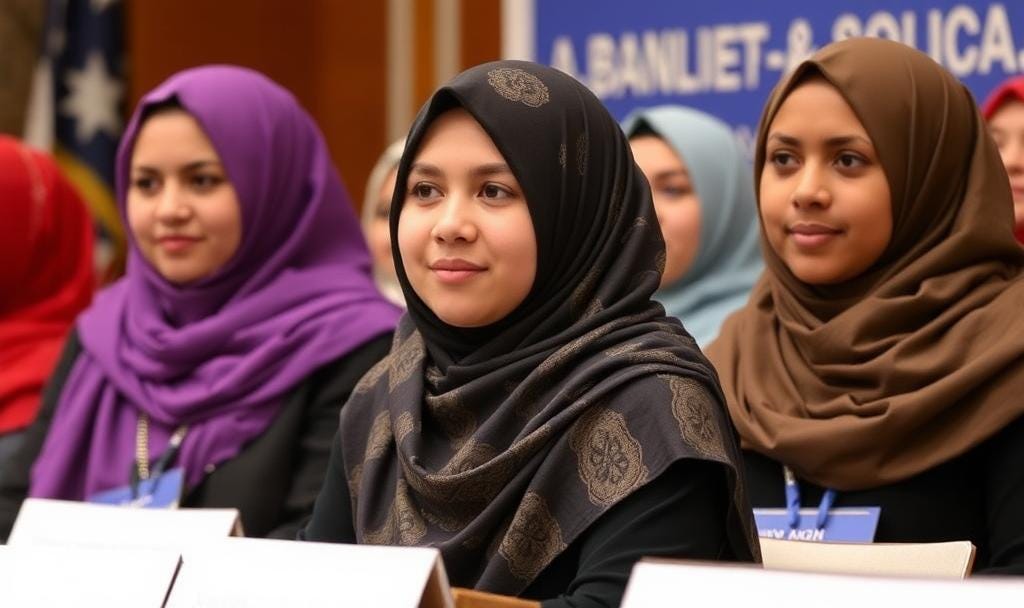New York State Senate Recognizes World Hijab Day
In a landmark move, the New York State Senate officially recognized February 1, 2025, as World Hijab Day, marking a significant step towards promoting religious tolerance and cultural understanding. The resolution, introduced by Senator Roxanne Persaud, aims to encourage international solidarity and raise awareness about the experiences of Muslim women who choose to wear the hijab.
The Council on American-Islamic Relations (CAIR), a prominent Muslim civil rights group, has welcomed this recognition, hailing it as a crucial step in combating prejudice and fostering mutual respect among diverse communities. This development comes as the 12th annual World Hijab Day approaches, which has gained global traction since its inception in 2013.
The Significance of World Hijab Day
World Hijab Day, founded by Bangladeshi American Nazma Khan, has evolved into a powerful platform for promoting awareness and dismantling stereotypes associated with the hijab. The day invites women of all faiths and backgrounds to experience wearing the hijab, fostering empathy and challenging misconceptions.CAIR-NY Executive Director Afaf Nasher emphasized the importance of this recognition, stating, "World Hijab Day is a significant opportunity to amplify the voices of hijab-wearing women and to combat the prejudice and discrimination they often face" This sentiment underscores the day's role in addressing daily challenges Muslim women encounter.
The Resolution's Impact
The New York State Senate's resolution is more than a symbolic gesture. It represents a concrete step towards acknowledging the diverse fabric of American society and the right to religious expression. By officially recognizing World Hijab Day, New York sets a precedent for other states and institutions, potentially leading to broader acceptance and understanding of Islamic practices.
Senator Roxanne Persaud's initiative in introducing this resolution demonstrates a commitment to inclusivity and religious freedom. It aligns with the principles of the First Amendment, which protects the free exercise of religion and prohibits the government from establishing or favoring any particular religion.
Global Reach and Local Impact
Since its inception, World Hijab Day has grown to include participation from over 150 countries. This global reach highlights the universal appeal of its message of tolerance and understanding. In New York, where diversity is a hallmark of the state's identity, the recognition of World Hijab Day takes on special significance. The event encourages dialogue and interaction between Muslim women and those of other faiths or no faith at all. By inviting non-Muslims to experience wearing the hijab for a day, World Hijab Day creates opportunities for personal connections and shared experiences that can break down barriers of misunderstanding.
Challenges and Controversies
Despite its positive intentions, World Hijab Day has not been without controversy. Critics argue that it oversimplifies the complex issues surrounding the hijab, including debates within Muslim communities about its religious significance and cultural implications. Some also express concern that the event might inadvertently trivialize the experiences of women who are forced to wear the hijab against their will in certain parts of the world. However, supporters of World Hijab Day maintain that the event is not about promoting the hijab itself but rather about fostering understanding and respect for personal choice in religious expression. They argue that the day serves as a platform for Muslim women to share their perspectives and reclaim their narrative in the face of widespread misconceptions.
Education and Awareness
One of the primary goals of World Hijab Day is to educate the public about the significance of the hijab in Islam. The hijab, often misunderstood as a symbol of oppression, is viewed by many Muslim women as an expression of faith, identity, and empowerment. Laiba Kauser, a participant in World Hijab Day events, shared her perspective: "For myself and many others, the hijab holds a sense of comfort, like a hug from Allah (God). It's not just a fabric we wear on our heads, but a symbol of our way of life". This personal insight offers a glimpse into the diverse reasons why Muslim women choose to wear the hijab.
Combating Discrimination
The recognition of World Hijab Day by the New York State Senate comes at a time when Muslim women, particularly those who wear the hijab, continue to face discrimination and harassment. A study cited by the World Hijab Day organization found that 69% of women who wore hijab reported at least one incident of discrimination compared to 29% of women who did not. This statistic underscores the importance of initiatives like World Hijab Day in raising awareness and promoting acceptance. By providing a platform for dialogue and understanding, the event aims to reduce incidents of discrimination and create a more inclusive society.
Looking Ahead
As World Hijab Day gains recognition and support, its potential impact on social attitudes and policy-making grows. The New York State Senate's resolution could pave the way for similar acknowledgments in other states and countries, contributing to a global movement for religious tolerance and cultural understanding. The challenge moving forward will be to translate the awareness raised by World Hijab Day into concrete actions that protect the rights of Muslim women and combat Islamophobia in all its forms. This may include advocating for stronger anti-discrimination laws, promoting diversity in workplaces and educational institutions, and encouraging more nuanced media representation of Muslim women.



